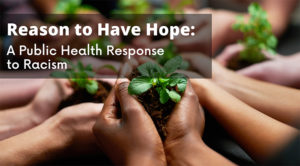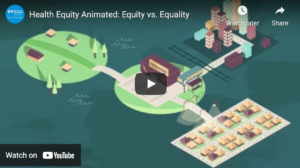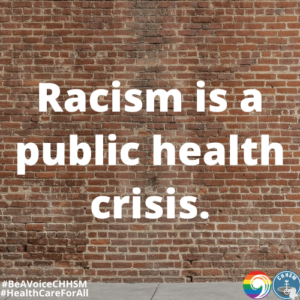Interactive Course Offers New Ways to Examine Racism as a Public Health Crisis

This summer, the UCC’s Council for Health and Human Service Ministries and Council on Racial and Ethnic Ministries is bringing a Synod Resolution of Witness to delegates of the biennial meeting calling on the church to declare and respond to racism as a public health crisis. But even before delegates debate and vote on the resolution, an important new resource will be released to help all settings of the church deal with and process the harsh realities of systemic racism and its consequences on people’s lives, health and well-being.
Reason to Have Hope: A Public Health Response to Racism is a multi-part, online, interactive course created by the Rev. Dr. Elyse Berry, CHHSM’s associate for advocacy and leadership development, with input from COREM. Following submission of the joint resolution, Synod committee members contacted Berry and asked that CHHSM and COREM put together a study piece for the resolution. The resulting course is easily adaptable for all settings of the church.
The course not only delivers historical and current information on systemic racism, but offers a strong theological perspective. To understand the complex issue of racism, says Berry, “the stories of injustice, social problems, and trauma do not capture the whole narrative. Resistance, solutions from lived experience, and resilience are all necessary parts of understanding the issue.”
Berry points to the practice of prophetic imagination. “This is where Spirit is speaking – in the moments of exodus, prophesy and resurrection,” she says. Prophetic imagination “invites us to envision what else might be possible and pay attention to how good those possibilities feel in our bones,” she adds. In addition to information and background, “every lesson includes illustrations of humanity and hope, such as stories of innovators making real change, wisdom from social movements, and policy considerations.”
The course also provides guidance and materials to support facilitators leading a group through the chapters. “Many learning challenges, book groups, and the like don’t always have the materials to help people reflect and provide guidance for this kind of shared learning,” says Berry. “It’s something I felt was necessary to include.”

Reason to Have Hope: A Public Health Response to Racism is broken down into more than two dozen short chapters. Each chapter contains reading material, podcasts, and/or videos on specific topics, as well as the section on hope for the future highlighting success stories. Participants will be invited to engage with any of the articles, videos, or podcast episodes in a given lesson.
Following a required short introduction, “there are five options for each lesson, as well as the piece on hope,” Berry says. This flexibility makes it possible to set up the course as a lesson a week, a lesson a day, or any other model of learning that is appropriate to the setting. “It’s also set up so you can pick and choose what you’ll engage with, without the course blocking you from moving on to the next section,” she says.
The only required chapter is the first — Grounding — which sets the stage for the work ahead. “Anti-racism work is deeply spiritual work. As such, it is embodied work, so we must start with the body,” says Berry. “Before jumping into the main content for the course, there is a section on grounding – in your body, in scripture, in understanding of power, on your unique place in the ecosystem of social change, and what God might have to say to you in all of this.”
Berry says she developed the idea of interspersing prayer, hope and reflection sections throughout the course after realizing how much the heaviness of racism can be exhausting and overwhelming.
After giving a talk on racism as a public health crisis, Berry was approached by a woman of African descent who described how difficult it had been to hear all of the data on the harms done to her community, even though she already was very aware of the issues. Taking that to heart, Berry built the course “in such a way so that you can focus mostly — or even solely — on the hope content, if that feels right for you. Reason to Have Hope: A Public Health Response to Racism is created to capture not only the crisis, but the response as well.”

The course focuses on anti-racism work across a broad spectrum of topics, including the history of racism in medicine and racism in current public health; the various political and social determinants affecting health equity; and such intersectional topics as mass incarceration, police brutality, immigration, poverty, the war on people who use drugs, and more.
“This anti-racism curriculum is an important step in helping the church — and society as a whole — understand the magnitude and history of racism in public health,” says Michael J. Readinger, CHHSM president and CEO. “Reason to Have Hope: A Public Health Response to Racism not only offers factual information, but also real-world ways of moving past discussion to doing the difficult work of creating solutions for a more just, caring, and compassionate world.”
The unique combination of prayer, information and data presentation, and discussion topics emphasizes that “slowing down, resting, noticing, reflecting, and remembering that the Spirit is with you are just as important as going through the public health material,” Berry says. “As author Resmaa Menakem teaches, ‘You can’t simply think your way through racism. You have to feel it.’”
The course ends with a special Benediction of Belonging “to remind us of our inherent connectedness and worth,” Berry adds. “My hope is that people feel supported and cared for as they go through this course. Liberation — which is what we’re working for — is a healing process, and I hope these elements give attention to that.”
Reason to Have Hope: A Public Health Response to Racism will be available in June. It will be accessible through the CHHSM website’s Advocacy Center and Anti-Racism Center.
Read the Resolution of Witness going to the UCC’s General Synod, to be held virtually July 11-18.
Learn more about CHHSM’s history of public health advocacy.
Join Our Mailing LIst
"*" indicates required fields
Follow on Facebook
New Resident Finds Belonging at Emmaus Homes - CHHSM
www.chhsm.org
Heather’s journey toward independence has been nothing short of inspiring. Since moving into her new home last year, Heather’s world has expanded in ways she never imagined. Leaving the familiarit...